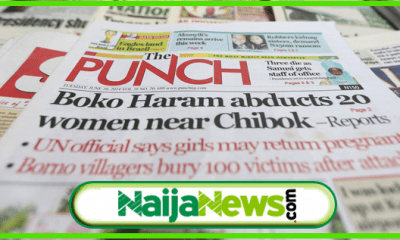Business
Naira Float Affect States As External Debt Rises To N3 Trillion

Following the recent floating of the naira by the Central Bank of Nigeria, the external debt burden of the 36 states and the Federal Capital Territory, has risen to N3 trillion.
Recall that CBN on Wednesday, June 14, 2023, directed Deposit Money Banks to remove the rate cap on the naira at the official Investors and Exporters’ Window of the foreign exchange market, to enable its free float against the dollar and other global currencies.
According to data from the FMDQ Exchange, the latest development led to an immediate decline in the value of the naira which fell from its 471/$ to 664.04/$ at the Investors & Exporters FX window.
Naija News learnt that on Tuesday, June 13, a day before the CBN changed its foreign exchange policy, the total external debt stock of states was $4.46bn (N2.09tn at N471/dollar) as of the end of December 2022.
By Friday, the debt stock, while retaining its dollar value of $4.46bn had grown to N2.96tn at N663.04/dollar. This means the states will need revenue in local currency to pay their foreign obligations.
The prevailing exchange rate means the external debts of states like Lagos ($1.25bn) have grown from N588.78bn to N828.84bn; Kaduna ($573.74m) from N270.23bn to N380.42bn; Edo ($261.15m) from N123bn to N173.16bn; Cross River ($209.53m) from N98.69bn to N138.92bn; Bauchi ($165.78m) from N78.08bn to N109.92bn.
The external debt profile of Abia ($94.28m) has grown from N44.41bn to N62.51bn; Adamawa ($104.61m) from N49.27bn to N69.36bn; Akwa Ibom ($44.85m) from N21.12bn to N29.74bn; Anambra ($103.82m) from N48.90bn to N68.84bn; Bayelsa ($60.39m) from N28.45bn to N40.04bn; Benue ($29.94m) from N14.10bn to N19.85bn; Borno ($18.10m) from N8.53bn to N12bn; Delta (59.87m) from N28.19bn to N39.69bn.
Ebonyi ($58.57m) from N27.59bn to N38.84bn; Ekiti ($105.59m) from N49.73bn to N70.01bn; Enugu ($120.86m) from N56.92bn to N80.13bn; Gombe ($32.48m) from N15.29bn to N21.54bn; Imo ($51.09m) from N24.07bn to N33.88bn; Jigawa ($26.99m) N12.71bn to N17.89bn; Kano ($100.67m) from N47.41bn to N66.75bn; Katsina ($53.92m) from N25.39bn to N35.75bn; Kebbi ($40.93m) from N19.28bn to N27.14bn.
In Kogi ($52.79m), external debt profile spiked from N24.87bn to N35.01bn; Kwara ($44.87m) from N21.13bn to N29.75bn; Nassarawa ($52.99m) from N24.96bbn to N35.14bn; Niger ($69.23m) from N32.61bn to N45.90bn; Ogun ($136.26m) from N64.18bn to N90.35bn; Ondo from ($90.68m) from N42.71bn to N60.13bn; Osun ($91.78m) from N43.23bn to N60.85bn; Oyo ($72.24m) from N34.02bn to N47.89bn; Plateau ($32.39bn) from N15.26bn to N21.48bn; Rivers ($87.13m) from N41.04bn to N57.77bn.
Despite boasting relatively smaller external debt profiles, states like Sokoto ($36.56m) have recorded debt growth from N17.22bn to N24.24bn; Taraba ($46.47m) from N21.89bn to N30.81bn; Yobe ($22.51m) from N10.60bn to N14.93bn; Zamfara ($28.86m) from N13.59bn to N19.14bn; FCT ($24.36m) from N11.47bn to N16.15bn.
According to a multinational financial service, JP Morgan, the naira will likely appreciate to N600/dollar in the coming months.
It said, “While it will take a few days for USD/NGN spot to settle, we fully expect an initial overshoot towards the parallel market rate of -750 or higher, after which, we expect USD/NGN to settle in the high 600s over [the] coming months”
Given that many states already experience revenue shortfalls, the unification of the naira exchange rate is anticipated to make the total debt load on states much worse. States with significant salary backlogs for workers, like Abia, Benue, Plateau, Taraba, Zamafara, Cross River, and Rivers, will likely feel this increase in their debt burden more.
However, the effect of the increase in their debt burden might be cushioned by an increase in their revenue allocation from the Federal Government.








